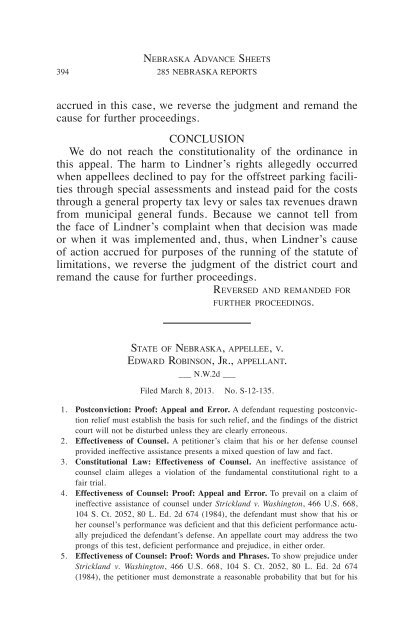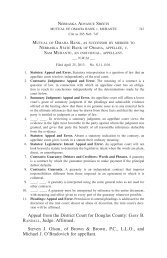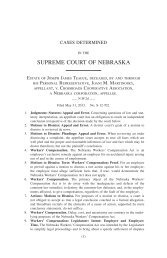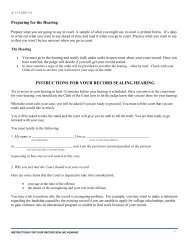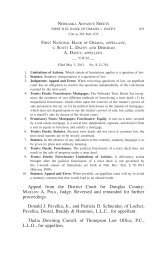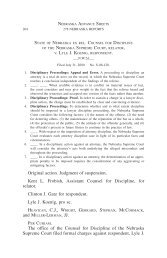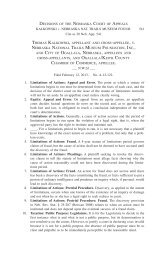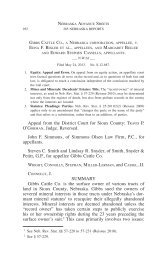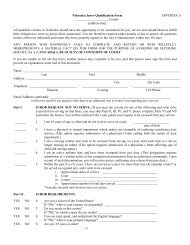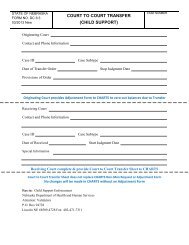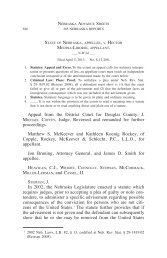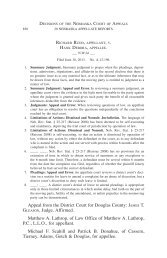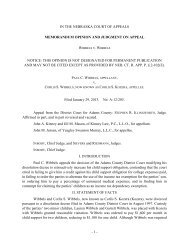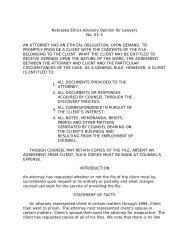accrued in this case, we reverse the judgment and remand ... - Justia
accrued in this case, we reverse the judgment and remand ... - Justia
accrued in this case, we reverse the judgment and remand ... - Justia
Create successful ePaper yourself
Turn your PDF publications into a flip-book with our unique Google optimized e-Paper software.
Nebraska Advance Sheets<br />
394 285 NEBRASKA REPORTS<br />
<strong>accrued</strong> <strong>in</strong> <strong>this</strong> <strong>case</strong>, <strong>we</strong> <strong>reverse</strong> <strong>the</strong> <strong>judgment</strong> <strong>and</strong> rem<strong>and</strong> <strong>the</strong><br />
cause for fur<strong>the</strong>r proceed<strong>in</strong>gs.<br />
CONCLUSION<br />
We do not reach <strong>the</strong> constitutionality of <strong>the</strong> ord<strong>in</strong>ance <strong>in</strong><br />
<strong>this</strong> appeal. The harm to L<strong>in</strong>dner’s rights allegedly occurred<br />
when appellees decl<strong>in</strong>ed to pay for <strong>the</strong> offstreet park<strong>in</strong>g facilities<br />
through special assessments <strong>and</strong> <strong>in</strong>stead paid for <strong>the</strong> costs<br />
through a general property tax levy or sales tax revenues drawn<br />
from municipal general funds. Because <strong>we</strong> cannot tell from<br />
<strong>the</strong> face of L<strong>in</strong>dner’s compla<strong>in</strong>t when that decision was made<br />
or when it was implemented <strong>and</strong>, thus, when L<strong>in</strong>dner’s cause<br />
of action <strong>accrued</strong> for purposes of <strong>the</strong> runn<strong>in</strong>g of <strong>the</strong> statute of<br />
limitations, <strong>we</strong> <strong>reverse</strong> <strong>the</strong> <strong>judgment</strong> of <strong>the</strong> district court <strong>and</strong><br />
rem<strong>and</strong> <strong>the</strong> cause for fur<strong>the</strong>r proceed<strong>in</strong>gs.<br />
<strong>reverse</strong>d <strong>and</strong> rem<strong>and</strong>ed for<br />
fur<strong>the</strong>r proceed<strong>in</strong>gs.<br />
State of Nebraska, appellee, v.<br />
Edward Rob<strong>in</strong>son, Jr., appellant.<br />
___ N.W.2d ___<br />
Filed March 8, 2013.<br />
No. S-12-135.<br />
1. Postconviction: Proof: Appeal <strong>and</strong> Error. A defendant request<strong>in</strong>g postconviction<br />
relief must establish <strong>the</strong> basis for such relief, <strong>and</strong> <strong>the</strong> f<strong>in</strong>d<strong>in</strong>gs of <strong>the</strong> district<br />
court will not be disturbed unless <strong>the</strong>y are clearly erroneous.<br />
2. Effectiveness of Counsel. A petitioner’s claim that his or her defense counsel<br />
provided <strong>in</strong>effective assistance presents a mixed question of law <strong>and</strong> fact.<br />
3. Constitutional Law: Effectiveness of Counsel. An <strong>in</strong>effective assistance of<br />
counsel claim alleges a violation of <strong>the</strong> fundamental constitutional right to a<br />
fair trial.<br />
4. Effectiveness of Counsel: Proof: Appeal <strong>and</strong> Error. To prevail on a claim of<br />
<strong>in</strong>effective assistance of counsel under Strickl<strong>and</strong> v. Wash<strong>in</strong>gton, 466 U.S. 668,<br />
104 S. Ct. 2052, 80 L. Ed. 2d 674 (1984), <strong>the</strong> defendant must show that his or<br />
her counsel’s performance was deficient <strong>and</strong> that <strong>this</strong> deficient performance actually<br />
prejudiced <strong>the</strong> defendant’s defense. An appellate court may address <strong>the</strong> two<br />
prongs of <strong>this</strong> test, deficient performance <strong>and</strong> prejudice, <strong>in</strong> ei<strong>the</strong>r order.<br />
5. Effectiveness of Counsel: Proof: Words <strong>and</strong> Phrases. To show prejudice under<br />
Strickl<strong>and</strong> v. Wash<strong>in</strong>gton, 466 U.S. 668, 104 S. Ct. 2052, 80 L. Ed. 2d 674<br />
(1984), <strong>the</strong> petitioner must demonstrate a reasonable probability that but for his
Nebraska Advance Sheets<br />
STATE v. ROBINSON 395<br />
Cite as 285 Neb. 394<br />
or her counsel’s deficient performance, <strong>the</strong> result of <strong>the</strong> proceed<strong>in</strong>g would have<br />
been different. A reasonable probability is a probability sufficient to underm<strong>in</strong>e<br />
confidence <strong>in</strong> <strong>the</strong> outcome.<br />
6. Motions for New Trial: Juror Misconduct: Proof. In order for a new trial to<br />
be granted because of a juror’s use of extraneous <strong>in</strong>formation, <strong>the</strong> party claim<strong>in</strong>g<br />
<strong>the</strong> misconduct has <strong>the</strong> burden to show by a preponderance of <strong>the</strong> evidence that<br />
prejudice has occurred.<br />
7. Jury Misconduct: Proof. Extraneous material or <strong>in</strong>formation considered by a<br />
jury can be prejudicial without proof of actual prejudice if (1) <strong>the</strong> material or<br />
<strong>in</strong>formation relates to an issue submitted to <strong>the</strong> jury <strong>and</strong> (2) <strong>the</strong>re is a reasonable<br />
possibility that it affected <strong>the</strong> jury’s verdict to <strong>the</strong> challenger’s prejudice.<br />
8. Trial: Effectiveness of Counsel: Witnesses. The decision to call, or not to call,<br />
a particular witness, made by counsel as a matter of trial strategy, even if that<br />
choice proves unproductive, will not, without more, susta<strong>in</strong> a f<strong>in</strong>d<strong>in</strong>g of <strong>in</strong>effectiveness<br />
of counsel.<br />
9. Effectiveness of Counsel. A counsel’s duty to <strong>in</strong>vestigate is <strong>the</strong> duty to make<br />
reasonable <strong>in</strong>vestigations or to make a reasonable decision that makes particular<br />
<strong>in</strong>vestigations unnecessary. In any <strong>in</strong>effectiveness <strong>case</strong>, a particular decision not<br />
to <strong>in</strong>vestigate must be directly assessed for reasonableness <strong>in</strong> all <strong>the</strong> circumstances,<br />
apply<strong>in</strong>g a heavy measure of deference to counsel’s <strong>judgment</strong>s.<br />
10. Postconviction: Effectiveness of Counsel: Appeal <strong>and</strong> Error. Although a<br />
motion for postconviction relief cannot be used to secure review of issues which<br />
<strong>we</strong>re or could have been litigated on direct appeal, when a defendant was represented<br />
both at trial <strong>and</strong> on direct appeal by <strong>the</strong> same lawyer, <strong>the</strong> defendant’s first<br />
opportunity to assert <strong>in</strong>effective assistance of counsel is <strong>in</strong> a motion for postconviction<br />
relief.<br />
11. Trial: Attorneys at Law. Trial counsel is afforded due deference to formulate<br />
trial strategy <strong>and</strong> tactics.<br />
Appeal from <strong>the</strong> District Court for Douglas County: Gregory<br />
M. Schatz, Judge. Affirmed.<br />
Sarah M. Mooney, of Mooney Law Office, for appellant.<br />
Jon Brun<strong>in</strong>g, Attorney General, <strong>and</strong> Kimberly A. Kle<strong>in</strong> for<br />
appellee.<br />
Wright, Connolly, Stephan, McCormack, Miller-Lerman,<br />
<strong>and</strong> Cassel, JJ., <strong>and</strong> Moore, Judge.<br />
Wright, J.<br />
I. NATURE OF CASE<br />
Edward Rob<strong>in</strong>son, Jr., was charged with <strong>and</strong> convicted of<br />
first degree murder <strong>and</strong> use of a deadly <strong>we</strong>apon to commit a
Nebraska Advance Sheets<br />
396 285 NEBRASKA REPORTS<br />
felony. He was sentenced to life <strong>in</strong> prison on <strong>the</strong> first degree<br />
murder conviction <strong>and</strong>, as a habitual crim<strong>in</strong>al, to 10 years’<br />
imprisonment on <strong>the</strong> conviction of <strong>the</strong> use of a deadly <strong>we</strong>apon<br />
to commit a felony, with <strong>the</strong> sentences to be served consecutively.<br />
He appealed <strong>the</strong> convictions <strong>and</strong> sentences to <strong>this</strong> court,<br />
<strong>and</strong> <strong>we</strong> affirmed. State v. Rob<strong>in</strong>son, 272 Neb. 582, 724 N.W.2d<br />
35 (2006) (Rob<strong>in</strong>son I), abrogated, State v. Thorpe, 280 Neb.<br />
11, 783 N.W.2d 749 (2010). Rob<strong>in</strong>son brought <strong>this</strong> action for<br />
postconviction relief based upon his claims relat<strong>in</strong>g to <strong>in</strong>effective<br />
assistance of his trial <strong>and</strong> appellate counsel. After an<br />
evidentiary hear<strong>in</strong>g, <strong>the</strong> district court denied postconviction<br />
relief. He now appeals from <strong>the</strong> order deny<strong>in</strong>g postconviction<br />
relief.<br />
II. SCOPE OF REVIEW<br />
[1] A defendant request<strong>in</strong>g postconviction relief must establish<br />
<strong>the</strong> basis for such relief, <strong>and</strong> <strong>the</strong> f<strong>in</strong>d<strong>in</strong>gs of <strong>the</strong> district<br />
court will not be disturbed unless <strong>the</strong>y are clearly erroneous.<br />
State v. Lee, 282 Neb. 652, 807 N.W.2d 96 (2011).<br />
[2] A petitioner’s claim that his or her defense counsel provided<br />
<strong>in</strong>effective assistance presents a mixed question of law<br />
<strong>and</strong> fact. State v. Edwards, 284 Neb. 382, 821 N.W.2d 680<br />
(2012). We review factual f<strong>in</strong>d<strong>in</strong>gs for clear error. Id. Whe<strong>the</strong>r<br />
<strong>the</strong> defense counsel’s performance was deficient <strong>and</strong> whe<strong>the</strong>r<br />
<strong>the</strong> petitioner was prejudiced by that performance are questions<br />
of law that <strong>we</strong> review <strong>in</strong>dependently of <strong>the</strong> lo<strong>we</strong>r court’s<br />
decision. Id.<br />
III. FACTS<br />
The facts underly<strong>in</strong>g Rob<strong>in</strong>son’s convictions are set forth <strong>in</strong><br />
detail <strong>in</strong> our op<strong>in</strong>ion resolv<strong>in</strong>g his direct appeal <strong>and</strong> need not<br />
be fully reiterated here. We summarize only those facts from<br />
Rob<strong>in</strong>son I <strong>and</strong> <strong>the</strong> record which relate directly to <strong>this</strong> postconviction<br />
proceed<strong>in</strong>g.<br />
1. Death of Herbert Fant<br />
Herbert Fant is <strong>the</strong> victim <strong>in</strong> <strong>this</strong> <strong>case</strong>, <strong>and</strong> his wife <strong>and</strong><br />
Rob<strong>in</strong>son’s wife are cous<strong>in</strong>s. On February 24, 2003, Fant<br />
became agitated with his domestic situation. After an argument<br />
with his wife, Fant attempted to contact Rob<strong>in</strong>son’s wife.
Nebraska Advance Sheets<br />
STATE v. ROBINSON 397<br />
Cite as 285 Neb. 394<br />
He <strong>we</strong>nt to Rob<strong>in</strong>son’s wife’s house, argued with her, <strong>and</strong><br />
<strong>the</strong>n left.<br />
Rob<strong>in</strong>son was <strong>in</strong>formed that his wife <strong>and</strong> Fant had been <strong>in</strong><br />
an argument, <strong>and</strong> he began look<strong>in</strong>g for Fant. Both men ended<br />
up at a fast-food restaurant around 10 p.m. They <strong>we</strong>re fight<strong>in</strong>g<br />
<strong>in</strong> <strong>the</strong> park<strong>in</strong>g lot when Rob<strong>in</strong>son, who had obta<strong>in</strong>ed a<br />
gun, shot Fant. Fant tried to get <strong>in</strong>to his vehicle, but Rob<strong>in</strong>son<br />
follo<strong>we</strong>d him <strong>and</strong> cont<strong>in</strong>ued shoot<strong>in</strong>g. Police apprehended<br />
Rob<strong>in</strong>son a few hours later at an automobile body shop.<br />
Rob<strong>in</strong>son’s nephew was also found at <strong>the</strong> shop. His nephew<br />
was <strong>we</strong>ar<strong>in</strong>g “a black lea<strong>the</strong>r type coat with a hood on it” l<strong>in</strong>ed<br />
with a syn<strong>the</strong>tic fur, which matched eyewitness descriptions of<br />
apparel worn by <strong>the</strong> <strong>in</strong>dividuals who <strong>we</strong>re present at <strong>the</strong> scene<br />
of <strong>the</strong> shoot<strong>in</strong>g.<br />
2. Murder Trial<br />
An amended <strong>in</strong>formation charged Rob<strong>in</strong>son with one count<br />
of first degree murder, one count of use of a deadly <strong>we</strong>apon to<br />
commit a felony, <strong>and</strong> be<strong>in</strong>g a habitual crim<strong>in</strong>al.<br />
Testimony was offered by both sides regard<strong>in</strong>g <strong>the</strong> vehicles<br />
driven by Fant <strong>and</strong> Rob<strong>in</strong>son. Fant’s vehicle was a green<br />
Chevrolet Caprice that had been pa<strong>in</strong>ted orange. Ho<strong>we</strong>ver,<br />
it was identified by a State witness as a Chevrolet Impala.<br />
Rob<strong>in</strong>son’s vehicle was a cream-colored GMC Yukon Denali,<br />
but an eyewitness testified that it was a white Cadillac Escalade.<br />
Rob<strong>in</strong>son filed a pretrial motion <strong>in</strong> lim<strong>in</strong>e to exclude <strong>the</strong> use<br />
of cellular telephone evidence, which motion <strong>the</strong> court overruled.<br />
At trial, numerous objections to <strong>the</strong> cellular telephone<br />
evidence <strong>we</strong>re overruled. Dur<strong>in</strong>g clos<strong>in</strong>g argument, <strong>the</strong> State<br />
referred to cellular telephone evidence <strong>in</strong> an attempt to show<br />
when <strong>and</strong> where Rob<strong>in</strong>son used his cellular telephone on <strong>the</strong><br />
night of <strong>the</strong> murder. This evidence was used to place him <strong>in</strong><br />
certa<strong>in</strong> locations based on <strong>the</strong> cellular telephone to<strong>we</strong>r utilized<br />
to make <strong>the</strong> call.<br />
The State made several comments dur<strong>in</strong>g clos<strong>in</strong>g argument,<br />
<strong>in</strong>form<strong>in</strong>g <strong>the</strong> jury that <strong>the</strong> cellular telephone records<br />
<strong>we</strong>re unimpeachable third-party <strong>in</strong>dependent evidence that p<strong>in</strong>po<strong>in</strong>ted<br />
a person’s exact location <strong>and</strong> time. Rob<strong>in</strong>son claims<br />
<strong>the</strong> State also made generalizations that <strong>we</strong>re not <strong>in</strong> evidence
Nebraska Advance Sheets<br />
398 285 NEBRASKA REPORTS<br />
or supported by <strong>the</strong> evidence. Rob<strong>in</strong>son’s counsel objected on<br />
several occasions but did not move for mistrial.<br />
Dur<strong>in</strong>g <strong>the</strong> trial, two jurors <strong>we</strong>re dismissed. Juror No. 3<br />
knew Fant’s wife, who had waved at juror No. 3. Later, juror<br />
No. 3 <strong>in</strong>formed <strong>the</strong> court she felt uncomfortable serv<strong>in</strong>g on <strong>the</strong><br />
jury because she knew Fant’s wife, <strong>and</strong> when asked to be dismissed,<br />
she was excused. Juror No. 22 was excused after be<strong>in</strong>g<br />
given a general admonishment because he was sleep<strong>in</strong>g dur<strong>in</strong>g<br />
key witness testimony.<br />
The State had offered <strong>in</strong> evidence a coat that matched <strong>the</strong><br />
description given by witnesses as <strong>the</strong> coat worn by <strong>the</strong> shooter<br />
<strong>the</strong> night Fant was killed. Rob<strong>in</strong>son’s nephew had been <strong>we</strong>ar<strong>in</strong>g<br />
<strong>this</strong> coat when <strong>the</strong> two <strong>we</strong>re arrested. Dur<strong>in</strong>g deliberations,<br />
<strong>the</strong> bailiff was called <strong>in</strong>to <strong>the</strong> jury room <strong>and</strong> <strong>in</strong>formed that <strong>the</strong><br />
jury had found a marijuana cigarette <strong>in</strong> a pocket of <strong>the</strong> coat.<br />
The marijuana cigarette had not been offered <strong>in</strong>to evidence by<br />
ei<strong>the</strong>r party, <strong>and</strong> presumably nei<strong>the</strong>r party knew it was <strong>the</strong>re.<br />
There was conflict<strong>in</strong>g evidence as to what persons <strong>the</strong> bailiff<br />
<strong>in</strong>formed of <strong>the</strong> discovery, but both parties’ attorneys <strong>we</strong>re<br />
notified. The jury cont<strong>in</strong>ued to deliberate <strong>and</strong> shortly <strong>the</strong>reafter<br />
announced its guilty verdict.<br />
Rob<strong>in</strong>son was found guilty of first degree murder <strong>and</strong> use<br />
of a deadly <strong>we</strong>apon to commit a felony. His motion for new<br />
trial was overruled. He was sentenced to life <strong>in</strong> prison on <strong>the</strong><br />
conviction of first degree murder <strong>and</strong>, as a habitual crim<strong>in</strong>al,<br />
to 10 years’ imprisonment on <strong>the</strong> conviction of <strong>the</strong> use of a<br />
deadly <strong>we</strong>apon to commit a felony, with <strong>the</strong> sentences to be<br />
served consecutively.<br />
3. Direct Appeal<br />
Rob<strong>in</strong>son appealed, <strong>and</strong> <strong>we</strong> affirmed his convictions <strong>and</strong><br />
sentences. See Rob<strong>in</strong>son I. He was represented by <strong>the</strong> same<br />
counsel dur<strong>in</strong>g trial <strong>and</strong> his direct appeal.<br />
In his direct appeal, Rob<strong>in</strong>son claimed, among o<strong>the</strong>r th<strong>in</strong>gs,<br />
that <strong>the</strong> trial court erred when it (1) admitted <strong>the</strong> evidence<br />
of <strong>the</strong> cellular telephone records, (2) overruled his objection<br />
to <strong>the</strong> coat found <strong>in</strong> <strong>the</strong> possession of his nephew, (3) failed<br />
to f<strong>in</strong>d that <strong>the</strong> State committed misconduct dur<strong>in</strong>g clos<strong>in</strong>g<br />
argument <strong>in</strong> regard to <strong>the</strong> cellular telephone evidence <strong>and</strong>
Nebraska Advance Sheets<br />
STATE v. ROBINSON 399<br />
Cite as 285 Neb. 394<br />
<strong>the</strong> identification of Fant’s <strong>and</strong> Rob<strong>in</strong>son’s vehicles, <strong>and</strong> (4)<br />
delayed <strong>the</strong> removal of <strong>the</strong> juror who knew Fant’s wife <strong>and</strong> <strong>the</strong><br />
juror who slept dur<strong>in</strong>g <strong>the</strong> trial.<br />
We held that <strong>the</strong> cellular telephone records <strong>we</strong>re properly<br />
admitted under <strong>the</strong> bus<strong>in</strong>ess records exception to <strong>the</strong> hearsay<br />
rule <strong>and</strong> that Rob<strong>in</strong>son had <strong>the</strong> opportunity to cross-exam<strong>in</strong>e<br />
all <strong>the</strong> communication company witnesses.<br />
The State offered <strong>the</strong> fur-l<strong>in</strong>ed lea<strong>the</strong>r coat because it<br />
matched <strong>the</strong> descriptions given by witnesses <strong>and</strong> was found on<br />
Rob<strong>in</strong>son’s nephew at <strong>the</strong> time of <strong>the</strong> arrests that occurred only<br />
a few hours after <strong>the</strong> shoot<strong>in</strong>g. We concluded that <strong>the</strong> evidence<br />
regard<strong>in</strong>g <strong>the</strong> coat was relevant <strong>and</strong> that <strong>this</strong> evidence was not<br />
unfairly prejudicial.<br />
Rob<strong>in</strong>son claimed that certa<strong>in</strong> statements made by <strong>the</strong> State<br />
dur<strong>in</strong>g clos<strong>in</strong>g argument constituted prosecutorial misconduct.<br />
After review<strong>in</strong>g <strong>the</strong> State’s clos<strong>in</strong>g argument, <strong>we</strong> determ<strong>in</strong>ed<br />
that <strong>the</strong> State did not misstate <strong>the</strong> law, did not act improperly,<br />
<strong>and</strong> did not mislead <strong>the</strong> jury.<br />
As to <strong>the</strong> two jurors who <strong>we</strong>re removed, <strong>we</strong> found <strong>the</strong> trial<br />
court did not abuse its discretion <strong>in</strong> remov<strong>in</strong>g jurors Nos. 3<br />
<strong>and</strong> 22.<br />
4. Postconviction Evidentiary Hear<strong>in</strong>g<br />
Rob<strong>in</strong>son’s motion for postconviction relief alleged that<br />
he was denied effective assistance of counsel when counsel<br />
failed to (1) request a mistrial after she was <strong>in</strong>formed that <strong>the</strong><br />
jury found a marijuana cigarette <strong>in</strong> an exhibit, (2) call a witness<br />
to establish an alibi defense, (3) enter evidence regard<strong>in</strong>g<br />
<strong>the</strong> makes <strong>and</strong> models of Fant’s <strong>and</strong> Rob<strong>in</strong>son’s vehicles, (4)<br />
<strong>in</strong>vestigate a Crimestoppers telephone call, (5) challenge <strong>the</strong><br />
cellular telephone evidence, (6) move for mistrial dur<strong>in</strong>g <strong>the</strong><br />
State’s clos<strong>in</strong>g argument or <strong>the</strong> conduct of two jurors, <strong>and</strong> (7)<br />
timely move for rehear<strong>in</strong>g <strong>in</strong> Rob<strong>in</strong>son’s direct appeal.<br />
At <strong>the</strong> evidentiary hear<strong>in</strong>g on postconviction, <strong>the</strong> court<br />
took judicial notice of <strong>the</strong> bill of exceptions, <strong>the</strong> exhibits, <strong>and</strong><br />
<strong>the</strong> entire file, <strong>in</strong>clud<strong>in</strong>g our op<strong>in</strong>ion <strong>in</strong> Rob<strong>in</strong>son I. Rob<strong>in</strong>son<br />
also offered <strong>the</strong> deposition testimony of <strong>the</strong> trial judge’s bailiff<br />
<strong>and</strong> Rob<strong>in</strong>son’s trial counsel, <strong>in</strong> addition to Rob<strong>in</strong>son’s<br />
testimony.
Nebraska Advance Sheets<br />
400 285 NEBRASKA REPORTS<br />
(a) Marijuana Cigarette<br />
In analyz<strong>in</strong>g <strong>the</strong> claim regard<strong>in</strong>g <strong>the</strong> marijuana cigarette<br />
found <strong>in</strong> <strong>the</strong> coat, <strong>the</strong> court concluded that both <strong>the</strong> prosecution<br />
<strong>and</strong> <strong>the</strong> defense had argued that <strong>the</strong> coat belonged to<br />
Rob<strong>in</strong>son’s nephew. It found <strong>the</strong>re was “no evidence that <strong>the</strong><br />
jury could have reasonably presumed that <strong>the</strong> coat belonged to<br />
[Rob<strong>in</strong>son]” or that he “had anyth<strong>in</strong>g to do with <strong>the</strong> improper<br />
extr<strong>in</strong>sic evidence discovered by” <strong>the</strong> jury. Rob<strong>in</strong>son’s trial<br />
counsel testified that she had not moved for mistrial because<br />
she did not th<strong>in</strong>k it would have affected <strong>the</strong> outcome of <strong>the</strong><br />
trial. Based on <strong>the</strong> totality of <strong>the</strong> evidence presented to <strong>the</strong><br />
jury regard<strong>in</strong>g guilt, <strong>the</strong> court concluded that Rob<strong>in</strong>son failed<br />
to show <strong>the</strong>re was a reasonable probability <strong>the</strong> outcome of <strong>the</strong><br />
trial would have been different but for trial counsel’s failure<br />
to move for mistrial or to <strong>in</strong>clude <strong>this</strong> issue <strong>in</strong> a motion for<br />
new trial.<br />
(b) Identification of Vehicles<br />
The court determ<strong>in</strong>ed that Rob<strong>in</strong>son failed to show why <strong>the</strong><br />
outcome of his trial would have been different had his counsel<br />
obta<strong>in</strong>ed copies of <strong>the</strong> registrations of <strong>the</strong> vehicles identified<br />
<strong>in</strong>consistently at trial.<br />
(c) Crimestoppers Tip <strong>and</strong> Witness<br />
The court determ<strong>in</strong>ed that Rob<strong>in</strong>son failed to show <strong>the</strong> result<br />
would have been different if a Crimestoppers tip would have<br />
been pursued or why he was prejudiced because counsel did<br />
not call a particular witness for <strong>the</strong> defense.<br />
(d) Cellular Telephone Records<br />
The court concluded that Rob<strong>in</strong>son did not show prejudice<br />
from his counsel’s failure to challenge cellular telephone<br />
records as irrelevant <strong>and</strong> unduly prejudicial, or why counsel<br />
should have offered an alternative expert op<strong>in</strong>ion to refute <strong>the</strong><br />
cellular telephone evidence.<br />
(e) Clos<strong>in</strong>g Argument, Removal<br />
of Jurors, <strong>and</strong> Rehear<strong>in</strong>g<br />
The court determ<strong>in</strong>ed that Rob<strong>in</strong>son failed to show he was<br />
prejudiced by his counsel’s failure to move for mistrial regard<strong>in</strong>g<br />
<strong>the</strong> prosecution’s clos<strong>in</strong>g argument, to move for removal
Nebraska Advance Sheets<br />
STATE v. ROBINSON 401<br />
Cite as 285 Neb. 394<br />
of <strong>the</strong> two jurors, or to timely move for rehear<strong>in</strong>g on direct<br />
appeal.<br />
Because Rob<strong>in</strong>son could not show deficient performance,<br />
prejudice, or a reasonable probability that <strong>the</strong> outcome of his<br />
trial would have been different, <strong>the</strong> court denied postconviction<br />
relief.<br />
IV. ASSIGNMENTS OF ERROR<br />
Rob<strong>in</strong>son claims, restated, that <strong>the</strong> postconviction court<br />
erred when it ruled that his counsel was not <strong>in</strong>effective because<br />
she (1) did not request a mistrial or <strong>in</strong>form Rob<strong>in</strong>son that<br />
<strong>the</strong> jury had discovered a marijuana cigarette <strong>in</strong> an exhibit,<br />
(2) failed to call a specific defense witness or <strong>in</strong>vestigate a<br />
Crimestoppers telephone call, (3) did not properly h<strong>and</strong>le <strong>the</strong><br />
cellular telephone evidence, (4) failed to establish <strong>the</strong> importance<br />
of <strong>the</strong> vehicle identification, <strong>and</strong> (5) did not move for<br />
mistrial or timely file a motion for rehear<strong>in</strong>g <strong>in</strong> Rob<strong>in</strong>son’s<br />
direct appeal.<br />
V. ANALYSIS<br />
All of Rob<strong>in</strong>son’s postconviction claims are based upon<br />
alleged <strong>in</strong>effective assistance of counsel. Because Rob<strong>in</strong>son’s<br />
trial counsel was also his appellate counsel, <strong>this</strong> is his first<br />
opportunity to assert his claims relat<strong>in</strong>g to <strong>in</strong>effective assistance<br />
of his trial <strong>and</strong> appellate counsel. See State v. Edwards,<br />
284 Neb. 382, 821 N.W.2d 680 (2012).<br />
[3,4] Whe<strong>the</strong>r <strong>the</strong> defense counsel’s performance was deficient<br />
<strong>and</strong> whe<strong>the</strong>r <strong>the</strong> petitioner was prejudiced by that performance<br />
are questions of law that <strong>we</strong> review <strong>in</strong>dependently<br />
of <strong>the</strong> lo<strong>we</strong>r court’s decision. Id. An <strong>in</strong>effective assistance of<br />
counsel claim alleges a violation of <strong>the</strong> fundamental constitutional<br />
right to a fair trial. Id. To prevail on a claim of <strong>in</strong>effective<br />
assistance of counsel under Strickl<strong>and</strong> v. Wash<strong>in</strong>gton,<br />
466 U.S. 668, 104 S. Ct. 2052, 80 L. Ed. 2d 674 (1984), <strong>the</strong><br />
defend ant must show that his or her counsel’s performance was<br />
deficient <strong>and</strong> that <strong>this</strong> deficient performance actually prejudiced<br />
<strong>the</strong> defendant’s defense. Id. An appellate court may<br />
address <strong>the</strong> two prongs of <strong>this</strong> test, deficient performance <strong>and</strong><br />
prejudice, <strong>in</strong> ei<strong>the</strong>r order. Id.
Nebraska Advance Sheets<br />
402 285 NEBRASKA REPORTS<br />
[5] We address whe<strong>the</strong>r Rob<strong>in</strong>son was prejudiced by his<br />
counsel’s performance at trial <strong>and</strong> on direct appeal. In address<strong>in</strong>g<br />
<strong>the</strong> “prejudice” component of <strong>the</strong> Strickl<strong>and</strong> test, <strong>we</strong> focus<br />
on whe<strong>the</strong>r a trial counsel’s deficient performance renders <strong>the</strong><br />
result of <strong>the</strong> trial unreliable or <strong>the</strong> proceed<strong>in</strong>g fundamentally<br />
unfair. Id. To show prejudice under <strong>the</strong> prejudice component<br />
of <strong>the</strong> Strickl<strong>and</strong> test, <strong>the</strong> petitioner must demonstrate a reasonable<br />
probability that but for his or her counsel’s deficient<br />
performance, <strong>the</strong> result of <strong>the</strong> proceed<strong>in</strong>g would have been different.<br />
Id. A reasonable probability is a probability sufficient to<br />
underm<strong>in</strong>e confidence <strong>in</strong> <strong>the</strong> outcome. Id.<br />
1. Marijuana Cigarette Found<br />
<strong>in</strong> Coat Pocket of Exhibit<br />
[6] Rob<strong>in</strong>son claims his trial counsel should have moved<br />
for mistrial when <strong>the</strong> jury found a marijuana cigarette <strong>in</strong> <strong>the</strong><br />
coat pocket. In order for a new trial to be granted because of<br />
a juror’s use of extraneous <strong>in</strong>formation, <strong>the</strong> party claim<strong>in</strong>g <strong>the</strong><br />
misconduct has <strong>the</strong> burden to show by a preponderance of <strong>the</strong><br />
evidence that prejudice has occurred. State v. Williams, 253<br />
Neb. 111, 568 N.W.2d 246 (1997).<br />
Dur<strong>in</strong>g jury deliberations, at least one juror, <strong>and</strong> probably<br />
all <strong>the</strong> jurors, became aware of <strong>the</strong> marijuana cigarette <strong>in</strong> <strong>the</strong><br />
pocket of <strong>the</strong> coat worn by someone at <strong>the</strong> scene on <strong>the</strong> night<br />
of Fant’s death. The juror alerted <strong>the</strong> bailiff, who <strong>in</strong>formed <strong>the</strong><br />
attorneys of <strong>the</strong> discovery. Shortly <strong>the</strong>reafter, <strong>the</strong> jury returned<br />
a guilty verdict. Rob<strong>in</strong>son’s trial counsel did not <strong>in</strong>clude <strong>the</strong><br />
discovery of <strong>the</strong> marijuana cigarette <strong>in</strong> a motion for mistrial<br />
or motion for new trial <strong>and</strong> did not <strong>in</strong>clude <strong>this</strong> claim on<br />
direct appeal.<br />
[7] Extraneous material or <strong>in</strong>formation considered by a jury<br />
can be prejudicial without proof of actual prejudice if (1) <strong>the</strong><br />
material or <strong>in</strong>formation relates to an issue submitted to <strong>the</strong><br />
jury <strong>and</strong> (2) <strong>the</strong>re is a reasonable possibility that it affected <strong>the</strong><br />
jury’s verdict to <strong>the</strong> challenger’s prejudice. State v. Thorpe, 280<br />
Neb. 11, 783 N.W.2d 749 (2010). The extraneous <strong>in</strong>formation<br />
was a marijuana cigarette found <strong>in</strong> a pocket of a coat match<strong>in</strong>g<br />
<strong>the</strong> description of a coat worn by someone at <strong>the</strong> scene of
Nebraska Advance Sheets<br />
STATE v. ROBINSON 403<br />
Cite as 285 Neb. 394<br />
<strong>the</strong> shoot<strong>in</strong>g on <strong>the</strong> night of <strong>the</strong> murder. Rob<strong>in</strong>son was on trial<br />
for first degree murder. He was not on trial for possession of<br />
illegal drugs. The extraneous <strong>in</strong>formation found by <strong>the</strong> jury<br />
was not related to <strong>the</strong> charges Rob<strong>in</strong>son was fac<strong>in</strong>g. Therefore,<br />
prejudice cannot be presumed <strong>in</strong> <strong>this</strong> situation.<br />
The postconviction court found that a verdict was announced<br />
shortly after <strong>the</strong> bailiff was alerted to <strong>the</strong> discovery of <strong>the</strong> marijuana<br />
cigarette, which <strong>in</strong>dicated that “a verdict had been determ<strong>in</strong>ed<br />
by <strong>the</strong> jury prior to <strong>the</strong> question of <strong>the</strong> juror regard<strong>in</strong>g<br />
<strong>the</strong> contents of <strong>the</strong> coat.” It concluded that based on <strong>the</strong> totality<br />
of <strong>the</strong> evidence presented to <strong>the</strong> jury on Rob<strong>in</strong>son’s guilt,<br />
Rob<strong>in</strong>son had failed to show that <strong>the</strong>re was a reasonable probability<br />
that <strong>the</strong> outcome of his trial would have been any different<br />
had his attorney moved for mistrial or made <strong>the</strong> extr<strong>in</strong>sic<br />
evidence part of a motion for new trial.<br />
Rob<strong>in</strong>son has <strong>the</strong> burden to prove prejudice, which means<br />
that but for his counsel’s <strong>in</strong>effective assistance, <strong>the</strong> outcome<br />
of <strong>the</strong> trial would have been different. There <strong>we</strong>re numerous<br />
facts <strong>in</strong> evidence that po<strong>in</strong>ted toward his guilt. Rob<strong>in</strong>son had a<br />
motivation for <strong>the</strong> kill<strong>in</strong>g, he pursued Fant, <strong>and</strong> <strong>the</strong>y <strong>we</strong>re argu<strong>in</strong>g<br />
at <strong>the</strong> time of <strong>the</strong> shoot<strong>in</strong>g. And one eyewitness identified<br />
Rob<strong>in</strong>son as <strong>the</strong> killer.<br />
Rob<strong>in</strong>son did not show <strong>the</strong>re was a reasonable probability<br />
that <strong>the</strong> discovery of <strong>the</strong> marijuana cigarette affected <strong>the</strong> jury’s<br />
determ<strong>in</strong>ation of his guilt of first degree murder. And <strong>we</strong> agree<br />
with <strong>the</strong> district court’s determ<strong>in</strong>ation that Rob<strong>in</strong>son has not<br />
shown <strong>the</strong> discovery of <strong>the</strong> marijuana cigarette was prejudicial.<br />
Rob<strong>in</strong>son failed to carry his burden to show <strong>the</strong> outcome would<br />
have been different but for his attorney’s failure to move for<br />
mistrial. The court did not err <strong>in</strong> reject<strong>in</strong>g Rob<strong>in</strong>son’s <strong>in</strong>effective<br />
assistance of counsel claim on <strong>this</strong> issue.<br />
2. Trial Counsel Did Not Inform Rob<strong>in</strong>son of<br />
Discovery of Marijuana Cigarette<br />
Until After Direct Appeal<br />
Because <strong>we</strong> have concluded <strong>the</strong>re was no error regard<strong>in</strong>g <strong>the</strong><br />
discovery of <strong>the</strong> marijuana cigarette, <strong>the</strong>re can be no error <strong>in</strong><br />
not <strong>in</strong>form<strong>in</strong>g Rob<strong>in</strong>son of <strong>the</strong> discovery until after his appeal.
Nebraska Advance Sheets<br />
404 285 NEBRASKA REPORTS<br />
Rob<strong>in</strong>son cannot prove that but for <strong>the</strong> failure to <strong>in</strong>form him<br />
of <strong>the</strong> discovery of <strong>the</strong> marijuana cigarette, <strong>the</strong> outcome of <strong>the</strong><br />
trial or appeal would have been different.<br />
3. Call<strong>in</strong>g Specific Witness<br />
Rob<strong>in</strong>son claimed that trial counsel was <strong>in</strong>effective for not<br />
call<strong>in</strong>g Shamika Brown as a witness. Brown was Rob<strong>in</strong>son’s<br />
bro<strong>the</strong>r’s fiance. She would have testified that she was not at<br />
<strong>the</strong> murder scene <strong>the</strong> night Fant was shot. She stated that she<br />
was with Rob<strong>in</strong>son’s bro<strong>the</strong>r at his house on <strong>the</strong> night Fant<br />
died. This would have disputed <strong>the</strong> testimony of <strong>the</strong> prosecution<br />
eyewitness who testified that Brown was present at <strong>the</strong><br />
shoot<strong>in</strong>g of Fant. Brown would have testified that <strong>this</strong> witness<br />
was upset with <strong>the</strong> Rob<strong>in</strong>son family <strong>and</strong> that <strong>in</strong> her op<strong>in</strong>ion, <strong>the</strong><br />
witness “pretty much had it out for <strong>the</strong>m.”<br />
Brown was arrested for witness tamper<strong>in</strong>g <strong>in</strong> connection<br />
with <strong>the</strong> <strong>case</strong>. Those charges <strong>we</strong>re eventually dropped aga<strong>in</strong>st<br />
her, but <strong>the</strong>y may have been pend<strong>in</strong>g dur<strong>in</strong>g Rob<strong>in</strong>son’s trial.<br />
Rob<strong>in</strong>son’s trial counsel testified that she did not call Brown as<br />
a witness because she did not th<strong>in</strong>k her testimony would have<br />
added anyth<strong>in</strong>g.<br />
[8] The decision to call, or not to call, a particular witness,<br />
made by counsel as a matter of trial strategy, even if that choice<br />
proves unproductive, will not, without more, susta<strong>in</strong> a f<strong>in</strong>d<strong>in</strong>g<br />
of <strong>in</strong>effectiveness of counsel. State v. Thomas, 278 Neb. 248,<br />
769 N.W.2d 357 (2009). Rob<strong>in</strong>son has not shown that call<strong>in</strong>g<br />
Brown as a witness would have changed <strong>the</strong> result.<br />
4. Investigation of Crimestoppers<br />
Telephone Call<br />
The court concluded that Rob<strong>in</strong>son had not set forth specific<br />
allegations regard<strong>in</strong>g <strong>the</strong> testimony of a witness who should<br />
have been called or how <strong>the</strong> <strong>in</strong>formation from a Crimestoppers<br />
tip might have been received <strong>in</strong> evidence at his trial.<br />
[9] A counsel’s duty to <strong>in</strong>vestigate is <strong>the</strong> duty to make<br />
reasonable <strong>in</strong>vestigations or to make a reasonable decision<br />
that makes particular <strong>in</strong>vestigations unnecessary. See State<br />
v. Palmer, 257 Neb. 702, 600 N.W.2d 756 (1999). In any<br />
<strong>in</strong>effectiveness <strong>case</strong>, a particular decision not to <strong>in</strong>vestigate
Nebraska Advance Sheets<br />
STATE v. ROBINSON 405<br />
Cite as 285 Neb. 394<br />
must be directly assessed for reasonableness <strong>in</strong> all <strong>the</strong> circumstances,<br />
apply<strong>in</strong>g a heavy measure of deference to counsel’s<br />
<strong>judgment</strong>s. Id.<br />
The record <strong>in</strong>dicates that <strong>the</strong> Crimestoppers telephone call<br />
was an anonymous call, <strong>in</strong> which <strong>the</strong> caller claimed to have<br />
overheard a young girl on a schoolbus say that her mo<strong>the</strong>r’s<br />
boyfriend had killed Fant. No o<strong>the</strong>r <strong>in</strong>formation was provided<br />
to prove <strong>the</strong> accuracy or credibility of <strong>the</strong> statements, <strong>and</strong><br />
no o<strong>the</strong>r reports came <strong>in</strong> through <strong>the</strong> hotl<strong>in</strong>e. At <strong>the</strong> hear<strong>in</strong>g,<br />
Rob<strong>in</strong>son did not produce any evidence regard<strong>in</strong>g <strong>the</strong> girl on<br />
<strong>the</strong> schoolbus or what course of <strong>in</strong>vestigation trial counsel<br />
could have pursued. Under <strong>the</strong>se circumstances, Rob<strong>in</strong>son cannot<br />
show that <strong>the</strong> testimony from an unknown person would<br />
have changed <strong>the</strong> result.<br />
5. Assignments of Error Addressed<br />
on Direct Appeal<br />
[10] Although a motion for postconviction relief cannot<br />
be used to secure review of issues which <strong>we</strong>re or could have<br />
been litigated on direct appeal, when a defendant was represented<br />
both at trial <strong>and</strong> on direct appeal by <strong>the</strong> same lawyer,<br />
<strong>the</strong> defendant’s first opportunity to assert <strong>in</strong>effective assistance<br />
of counsel is <strong>in</strong> a motion for postconviction relief. State v.<br />
McK<strong>in</strong>ney, 279 Neb. 297, 777 N.W.2d 555 (2010). Rob<strong>in</strong>son<br />
had <strong>the</strong> same attorney for his trial <strong>and</strong> direct appeal. Therefore,<br />
his postconviction motion is his first opportunity to raise some<br />
of his claims of <strong>in</strong>effective assistance of counsel. Ho<strong>we</strong>ver,<br />
<strong>we</strong> will not readdress issues <strong>we</strong> have already decided on his<br />
direct appeal. He raises four such claims <strong>in</strong> his postconviction<br />
motion. We address each <strong>in</strong> turn.<br />
(a) Cellular Telephone<br />
Evidence at Trial<br />
At <strong>the</strong> trial, <strong>the</strong> State <strong>in</strong>troduced evidence related to <strong>the</strong><br />
use of cellular telephones <strong>in</strong> an attempt to place Rob<strong>in</strong>son<br />
<strong>and</strong> Fant <strong>in</strong> <strong>the</strong> same area at <strong>the</strong> time of <strong>the</strong> murder by us<strong>in</strong>g<br />
signals from different cellular telephone to<strong>we</strong>rs. On direct<br />
appeal, <strong>we</strong> concluded that <strong>the</strong> records <strong>we</strong>re properly admitted,<br />
because noth<strong>in</strong>g <strong>in</strong>dicated <strong>the</strong> cellular telephone records <strong>we</strong>re
Nebraska Advance Sheets<br />
406 285 NEBRASKA REPORTS<br />
not trustworthy. Thus, <strong>this</strong> part of <strong>the</strong> claim was previously<br />
decided on direct appeal.<br />
Counsel also claimed <strong>the</strong> records should have been excluded<br />
as irrelevant <strong>and</strong> unduly prejudicial. Ho<strong>we</strong>ver, on direct appeal,<br />
<strong>we</strong> refused to consider <strong>the</strong> argument because counsel had not<br />
properly preserved it by objection at trial.<br />
[11] Trial counsel is afforded due deference to formulate<br />
trial strategy <strong>and</strong> tactics. See State v. Timmens, 282 Neb. 787,<br />
805 N.W.2d 704 (2011). Rob<strong>in</strong>son’s trial counsel objected to<br />
<strong>the</strong> cellular telephone evidence on numerous occasions <strong>and</strong> on<br />
different grounds, <strong>and</strong> <strong>the</strong> objections <strong>we</strong>re overruled. Rob<strong>in</strong>son<br />
claims that because counsel did not object to <strong>the</strong> evidence as<br />
irrelevant <strong>and</strong> unduly prejudicial, he was prejudiced. Ho<strong>we</strong>ver,<br />
he has not shown that <strong>the</strong> evidence was not relevant or that it<br />
was unfairly prejudicial. He has not shown that <strong>the</strong> outcome of<br />
<strong>the</strong> trial would have been different if trial counsel had objected<br />
to <strong>the</strong> admission of <strong>the</strong> telephone records as irrelevant <strong>and</strong><br />
unduly prejudicial.<br />
(b) Identification of Vehicles<br />
On direct appeal, <strong>we</strong> did not specifically address <strong>the</strong> importance<br />
of vehicle identification. We discussed <strong>the</strong> identification<br />
of <strong>the</strong> vehicles <strong>in</strong> <strong>the</strong> context of <strong>the</strong> prosecutor’s comments<br />
made dur<strong>in</strong>g clos<strong>in</strong>g argument. Although <strong>the</strong> prosecutor <strong>we</strong>nt<br />
beyond <strong>the</strong> facts <strong>in</strong> his clos<strong>in</strong>g argument by mention<strong>in</strong>g that<br />
Rob<strong>in</strong>son’s vehicle was customized, <strong>we</strong> did not f<strong>in</strong>d that a miscarriage<br />
of justice occurred as a result of <strong>the</strong> State’s objectionable<br />
references to <strong>the</strong> customization of Rob<strong>in</strong>son’s vehicle. We<br />
concluded that because <strong>the</strong>re was no miscarriage of justice <strong>and</strong><br />
because Rob<strong>in</strong>son did not make a timely motion for mistrial<br />
based on prosecutorial misconduct, his assignment of error was<br />
without merit.<br />
We are left to determ<strong>in</strong>e whe<strong>the</strong>r Rob<strong>in</strong>son was unfairly<br />
prejudiced because his counsel did not offer certified copies<br />
of <strong>the</strong> titles or registrations of <strong>the</strong> vehicles at issue <strong>in</strong> trial so<br />
that counsel could <strong>the</strong>n object when witnesses misidentified<br />
<strong>the</strong> vehicles as a Chevrolet Impala <strong>in</strong>stead of a Caprice <strong>and</strong> a<br />
Cadillac Escalade <strong>in</strong>stead of a GMC Yukon Denali. Rob<strong>in</strong>son<br />
argues that his trial counsel should have offered certified copies
Nebraska Advance Sheets<br />
STATE v. ROBINSON 407<br />
Cite as 285 Neb. 394<br />
of <strong>the</strong> titles or registrations of Fant’s <strong>and</strong> Rob<strong>in</strong>son’s vehicles<br />
so as to prevent <strong>the</strong> State from referr<strong>in</strong>g to <strong>the</strong> vehicles as different<br />
models. Rob<strong>in</strong>son has not shown how <strong>the</strong> outcome of<br />
his trial could have been different if <strong>the</strong> makes <strong>and</strong> models<br />
of <strong>the</strong> vehicles <strong>we</strong>re <strong>in</strong> evidence. He has failed to show how<br />
he was prejudiced because his trial counsel did not offer <strong>the</strong><br />
vehicle registrations.<br />
(c) Motions for Mistrial Dur<strong>in</strong>g<br />
Clos<strong>in</strong>g Argument<br />
Rob<strong>in</strong>son’s trial counsel objected to parts of <strong>the</strong> prosecution’s<br />
clos<strong>in</strong>g argument, <strong>and</strong> two of those objections <strong>we</strong>re<br />
overruled. On direct appeal, <strong>we</strong> rejected Rob<strong>in</strong>son’s claim of<br />
prosecutorial misconduct. We concluded that <strong>the</strong> prosecutor<br />
did not misstate <strong>the</strong> law <strong>and</strong> did not mislead <strong>the</strong> jury. Because<br />
trial counsel did not move for mistrial after <strong>the</strong>se statements<br />
<strong>we</strong>re made, absent pla<strong>in</strong> error, <strong>we</strong> would not consider <strong>the</strong><br />
assignments on direct appeal. Rob<strong>in</strong>son I. In his postconviction<br />
claim, Rob<strong>in</strong>son argues that because counsel did not make<br />
a motion for mistrial, he was prejudiced. This assignment has<br />
been decided on direct appeal.<br />
Rob<strong>in</strong>son’s trial counsel objected to certa<strong>in</strong> parts of <strong>the</strong><br />
prosecutor’s clos<strong>in</strong>g argument <strong>and</strong> did not object to o<strong>the</strong>r<br />
parts. Trial counsel did not make any motions for mistrial after<br />
<strong>the</strong> prosecution’s clos<strong>in</strong>g argument. We rejected Rob<strong>in</strong>son’s<br />
claim of prosecutorial misconduct on direct appeal. Therefore,<br />
Rob<strong>in</strong>son’s claim on <strong>this</strong> issue is procedurally barred.<br />
(d) No Motion for Mistrial<br />
for Jury Misconduct<br />
There <strong>we</strong>re separate issues regard<strong>in</strong>g two jurors dur<strong>in</strong>g<br />
<strong>the</strong> course of <strong>the</strong> trial. Juror No. 3 knew Fant’s wife through<br />
church, eventually told <strong>the</strong> trial court she felt uncomfortable<br />
serv<strong>in</strong>g on <strong>the</strong> jury, <strong>and</strong> said she wanted to be removed from<br />
<strong>the</strong> jury. Her request was granted. Juror No. 22 fell asleep dur<strong>in</strong>g<br />
portions of <strong>the</strong> trial. The jury was given a general admonishment,<br />
but <strong>the</strong> juror cont<strong>in</strong>ued to fall asleep <strong>and</strong> was removed<br />
from <strong>the</strong> jury. Both jurors <strong>we</strong>re removed from <strong>the</strong> jury before<br />
<strong>the</strong> <strong>case</strong> was submitted to <strong>the</strong> jury.
Nebraska Advance Sheets<br />
408 285 NEBRASKA REPORTS<br />
On direct appeal, <strong>we</strong> concluded that <strong>in</strong> respect to juror<br />
No. 3, <strong>the</strong> record did not suggest that <strong>the</strong>re was any misconduct<br />
on <strong>the</strong> juror’s part, much less prejudicial misconduct.<br />
We concluded <strong>the</strong> record did not suggest Rob<strong>in</strong>son was prejudiced<br />
by <strong>the</strong> removal of <strong>the</strong> juror who slept dur<strong>in</strong>g parts of<br />
<strong>the</strong> testimony.<br />
On direct appeal, <strong>we</strong> concluded <strong>the</strong> court did not abuse its<br />
discretion <strong>in</strong> remov<strong>in</strong>g <strong>the</strong> two jurors. Rob<strong>in</strong>son is procedurally<br />
barred from reassert<strong>in</strong>g <strong>this</strong> claim.<br />
6. Motion for Rehear<strong>in</strong>g<br />
on Direct Appeal<br />
Rob<strong>in</strong>son claims his counsel was <strong>in</strong>effective by not timely<br />
fil<strong>in</strong>g a motion for rehear<strong>in</strong>g after <strong>we</strong> affirmed Rob<strong>in</strong>son’s convictions<br />
<strong>and</strong> sentences on direct appeal. Motions for rehear<strong>in</strong>g<br />
are discretionary with <strong>this</strong> court. On postconviction, Rob<strong>in</strong>son<br />
has not shown that <strong>we</strong> would have granted his motion for<br />
rehear<strong>in</strong>g or that if <strong>the</strong> motion had been granted, <strong>we</strong> would<br />
have changed our op<strong>in</strong>ion <strong>and</strong> granted him redress.<br />
VI. CONCLUSION<br />
Because Rob<strong>in</strong>son cannot establish that he was prejudiced<br />
by his counsel’s representation, <strong>we</strong> f<strong>in</strong>d no merit to his<br />
assignments of error. We affirm <strong>the</strong> district court’s denial of<br />
Rob<strong>in</strong>son’s motion for postconviction relief.<br />
Affirmed.<br />
Heavican, C.J., not participat<strong>in</strong>g.<br />
Butler County Dairy, L.L.C., appellant, v. Butler County,<br />
Nebraska, <strong>and</strong> Township of Read, Butler County,<br />
Nebraska, appellees, <strong>and</strong> Township of Summit,<br />
Butler County, Nebraska, <strong>in</strong>tervenor-appellee.<br />
___ N.W.2d ___<br />
Filed March 8, 2013.<br />
No. S-12-173.<br />
1. Statutes: Appeal <strong>and</strong> Error. To <strong>the</strong> extent an appeal calls for statutory <strong>in</strong>terpretation<br />
or presents questions of law, an appellate court must reach an <strong>in</strong>dependent<br />
conclusion irrespective of <strong>the</strong> determ<strong>in</strong>ation made by <strong>the</strong> court below.


